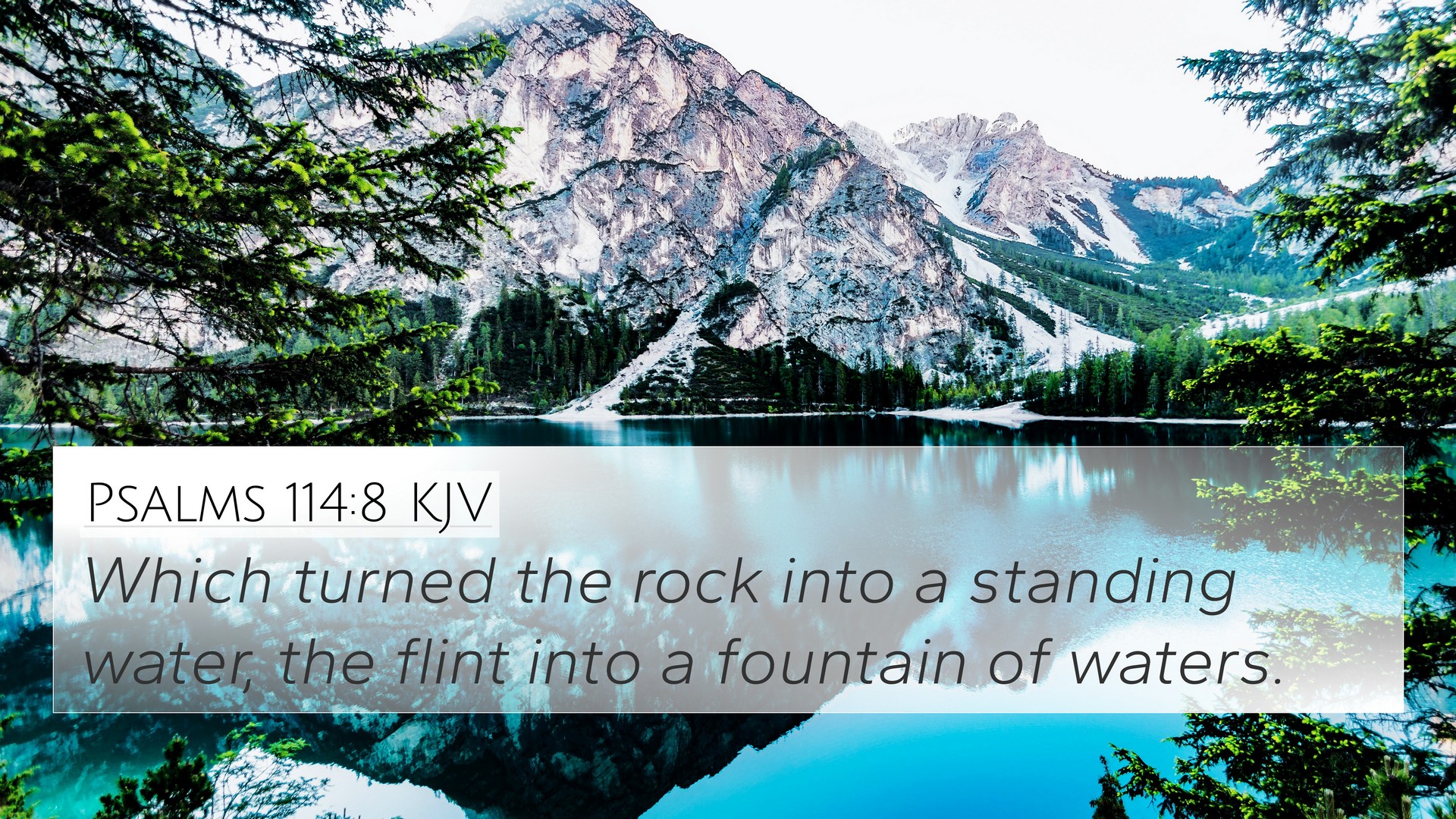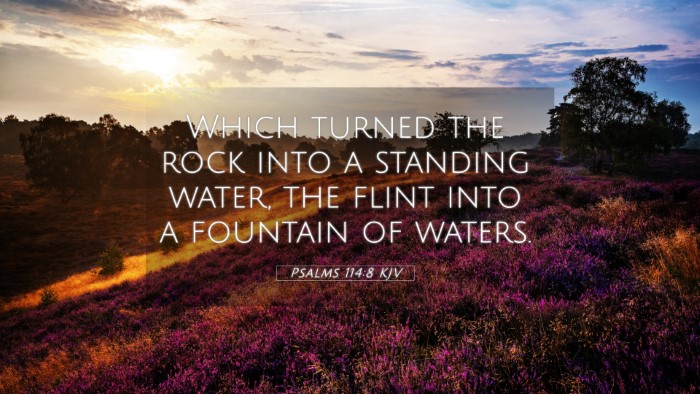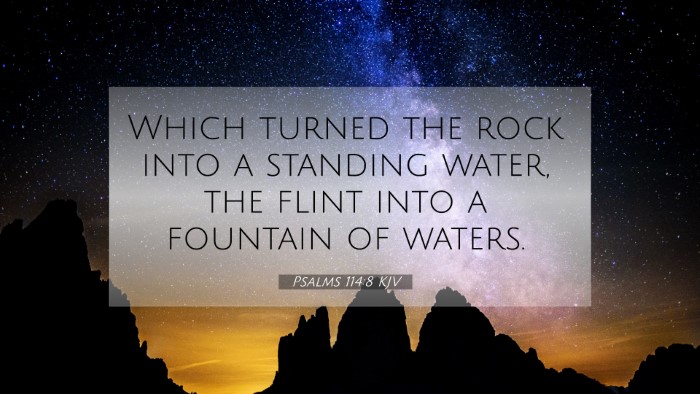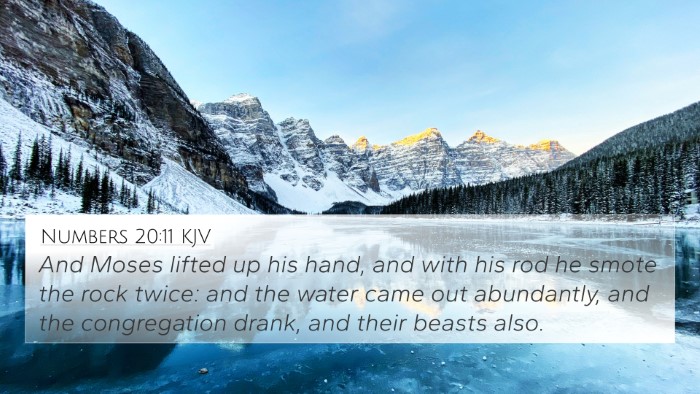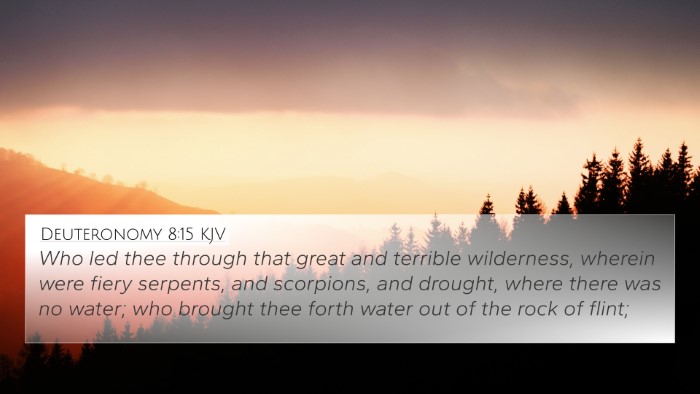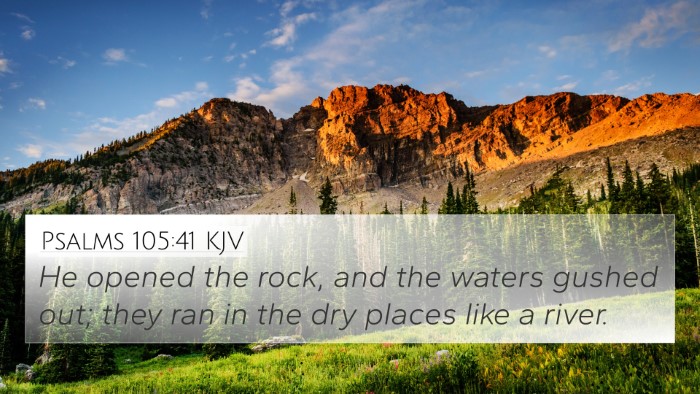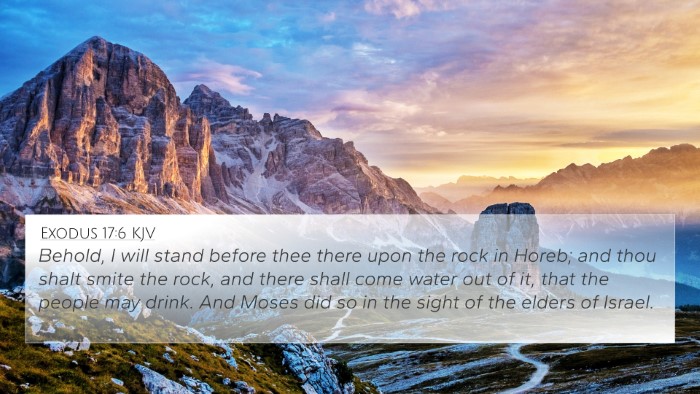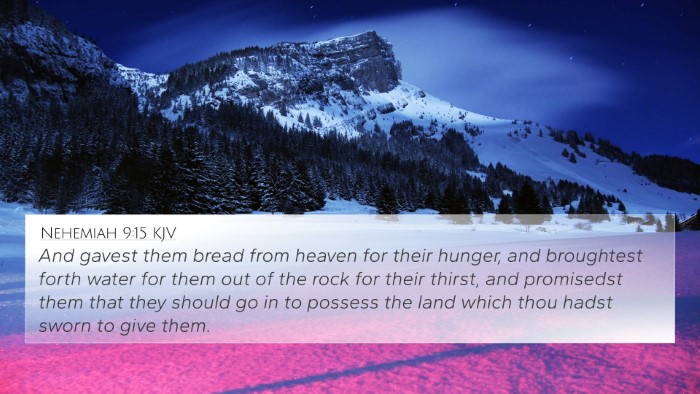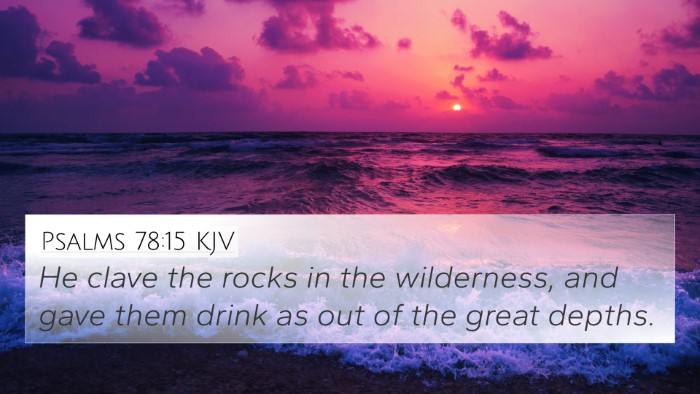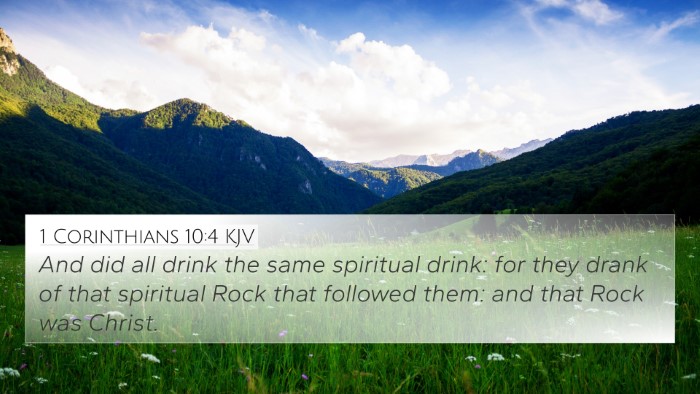Psalms 114:8 - Summary and Interpretation
Verse: "Which turned the rock into a standing water, the flint into a fountain of waters." - Psalms 114:8
This verse reflects God's miraculous power and ability to provide for His people in their time of need. It demonstrates a profound transformation whereby hard, unyielding elements like a rock and flint are turned into sources of life-giving water. The implications are both physical, as in the sustenance of Israel during their wilderness travels, and spiritual, representing the divine intervention and care of God.
Commentary Insights
Matthew Henry Commentary
Matthew Henry emphasizes the miraculous power of God in this verse, noting that the transformation of solid rock into water symbolizes His ability to provide for His people from seemingly impossible sources. His commentary suggests that this event serves as a reminder of God's ongoing faithfulness to His people and His capacity to meet their needs.
Albert Barnes Commentary
Albert Barnes interprets this passage as a vivid illustration of God's providence. He highlights the contrast between the desolate state of hard rock and the refreshing nature of water, suggesting that the former represents human limitations while the latter symbolizes God's abundance. Barnes points out that this serves as both a historical account and a metaphor for spiritual sustenance that God provides to believers.
Adam Clarke Commentary
Adam Clarke provides an exegetical understanding of this verse, drawing connections between the physical act of turning rock into water and the indispensable needs of human survival. Clarke also notes this verse in the context of God's covenant with His people, illustrating how God’s intervention can transform dire situations into occasions of blessings and abundance.
Thematic Bible Verse Connections
- Exodus 17:6: “Behold, I will stand before thee there upon the rock in Horeb; and thou shalt smite the rock, and there shall come water out of it, that the people may drink.” - This verse parallels the transformative power of God in providing water from the rock.
- Numbers 20:11: “And Moses lifted up his hand, and with his rod he smote the rock twice: and the water came out abundantly…” - Illustrates the same miraculous provision of water by God.
- Isaiah 41:18: “I will open rivers in high places, and fountains in the midst of the valleys: I will make the wilderness a pool of water, and the dry land springs of water.” - This connects to the themes of God's blessings in desolate places.
- John 4:14: “But whosoever drinketh of the water that I shall give him shall never thirst; but the water that I shall give him shall be in him a well of water springing up into everlasting life.” - A New Testament reflection of God providing spiritual sustenance.
- Revelation 7:17: “For the Lamb which is in the midst of the throne shall feed them, and shall lead them unto living fountains of waters...” - Reinforces the concept of divine provision in a spiritual context.
- Psalm 78:15-16: “He clave the rocks in the wilderness, and gave them drink as out of the great depths. He brought streams also out of the rock…” - Another testament to God's sustenance.
- Jeremiah 2:13: “For my people have committed two evils; they have forsaken me the fountain of living waters, and hewed them out cisterns, broken cisterns, that can hold no water.” - Highlights the significance of seeking true sustenance from God.
- Matthew 5:6: “Blessed are they which do hunger and thirst after righteousness: for they shall be filled.” - Echoes the theme of spiritual hunger and fulfillment.
- 1 Corinthians 10:4: “And did all drink the same spiritual drink: for they drank of that spiritual Rock that followed them: and that Rock was Christ.” - Connects the Old Testament experience with New Testament revelations.
- Psalm 23:2: “He maketh me to lie down in green pastures: he leadeth me beside the still waters.” - Illustrates God's provision of peace and sustenance.
Applications and Reflections
Psalms 114:8 serves as a profound reminder of God's capability to create abundance from what seems scarce. In examining this verse, there's an invitation for readers to reflect on their own situations where they may feel deprived or in need. It encourages believers to trust in God’s power to provide and to recognize the often-hidden blessings that come from His interventions.
Moreover, understanding this verse in the context of cross-referencing with related Biblical texts allows for a richer interpretation and understanding of God’s continuous relationship with His people throughout scripture.
In the study of Bible verses that relate to each other, this verse invites us to delve deeper into the themes of divine provision, transformation, and the spiritual parallels that exist throughout both the Old and New Testaments. By utilizing tools for Bible cross-referencing, individuals can explore further how similar themes are woven throughout scripture, enriching their understanding of God's character and promises.
Learning and Study Tools
For those interested in enhancing their study of thematic Bible verse connections, consider utilizing a Bible concordance or a comprehensive Bible cross-reference guide. These tools can significantly aid in navigating the connections between various verses, allowing for a more immersive and informative Bible study experience.
Practicing cross-reference Bible study methods can also greatly enhance one's comprehension of how Biblical texts converse with one another, leading to deeper insights into spiritual truths revealed throughout the scriptures.
Conclusion
In summary, Psalms 114:8 encapsulates the transformative capability of God to provide life from barrenness. Engaging in cross-referencing Biblical texts leads to a better understanding of this magnificent trait of God as seen throughout the scriptures. As we explore individual verses in their broader context, we not only strengthen our faith but also cultivate a deeper relationship with the Creator.
